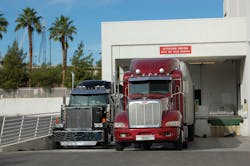DOT seeks mandatory detention pay via reauthorization proposal
As part of its package of legislative recommendations called the Grow America Act, the U.S. Dept. of Transportation is asking Congress for authority to force carriers to pay drivers at least the hourly minimum wage for time spent on duty but not driving. DOT’s proposal carves out an exception if on-duty, not-driving time is covered under a collective bargaining agreement with a unit certified by the National Labor Relations Board.
The driver compensation measure is one of more than 30 provisions included in the Grow America Act’s Title V, which addresses the motor carrier program. None of those provisions rival the driver compensation language in terms of policy, however. “That’s clearly the biggest policy change in the motor carrier provisions and one we are clearly concerned about,” American Trucking Associations Executive Vice President Dave Osiecki told FleetOwner.
Although DOT’s summary of the Grow America Act refers specifically to drivers being “frequently detained for extended periods at shippers or receivers’ facilities,” the proposed statutory language would cover any time on duty but not driving. The legislation would apply to drivers of both trucks and buses.
The proposed legislation “will ensure fair pay for long-distance bus and truck drivers who are often paid by the miles they travel, not their total time on-duty, and face economic pressure to jeopardize safety by driving beyond the mandatory limits,” said FMCSA Administrator Anne Ferro in DOT’s announcement of the Grow America Act.
DOT’s proposal could be the first attempt in decades by a presidential administration to directly regulate truck driver pay, and the measure’s prospects would appear dim as long as the Republicans control at least the U.S. House of Representatives. Even so, industry groups are hardly ignoring it.
Complaining in an ATA news release that DOT’s legislative proposal focuses far more on rail than trucking, Osiecki said that “even more disheartening, the only reference to trucking in the administration’s announcement is a proposal by the Department of Transportation to impose a one-size-fits-all compensation model on an incredibly diverse industry – an extraordinarily misguided proposal for a Department that claims to be data-driven.”
FMCSA has several studies in progress on the effects of detention and driver pay on trucking safety, but they are not scheduled to be completed until late 2015. For FMCSA to request this legislation now prejudges the outcome of those studies, Osiecki told FleetOwner.
But the Obama administration has a powerful ally on the issue. The Owner-Operator Independent Drivers Association praised DOT for the proposal. OOIDA has long argued that until the government addresses the issue of detention time changes to the hours-of-service regulations and requirements for electronic logs will have little or no effect on trucking safety.
“Congress should follow through with the Administration's recognition of the connection between highway safety and driver pay by making sure that all truck drivers are compensated for all of their on-duty time,” said OOIDA President and CEO Jim Johnston. He cited the efforts of both Ferro and U.S. Rep. Peter DeFazio (D-Ore.) in generating greater attention on the issue of detention time.
In the last Congress, DeFazio introduced a bill that would have required DOT to set standards for the maximum number of hours that driver could be detained by a shipper or receiver without compensation before the loading or unloading of the vehicle. The bill, which did not advance beyond its introduction, had 12 cosponsors, 11 of which were Democrats.
Ferro has been quite candid in recent months that FMCSA sees the need for changes in driver compensation to address what she views as the pitfalls of paying strictly by the mile or load.
For example, at a House Small Business Committee hearing in November, Ferro said that the combination of mileage-based pay and extreme loading dock delays hurt drivers’ ability to be safe and efficient. “In short, uncompensated delays force drivers to press legal and physical limits to capture a day’s pay,” Ferro told the committee. “The logistics industry gets this time free on the backs of the drivers and small businesses. Uncompensated detention time needs your attention, because what makes the job better, often makes the job safer.”
